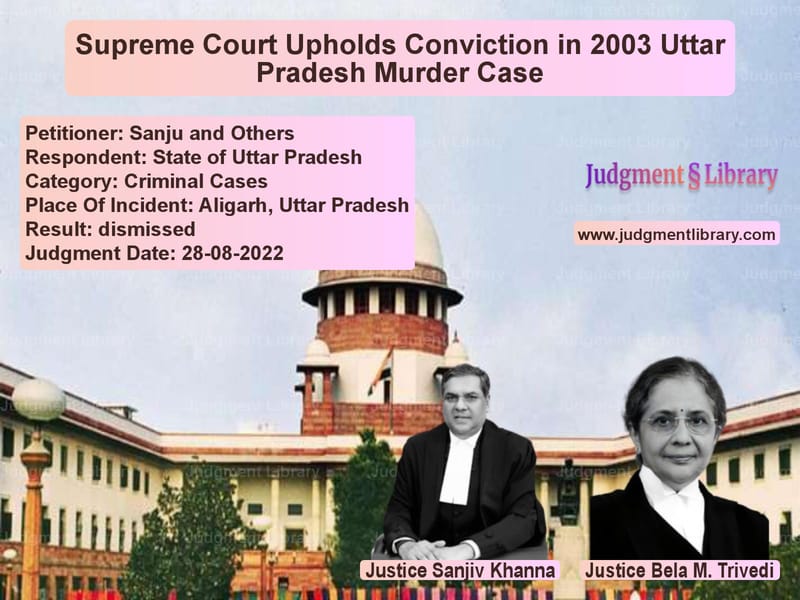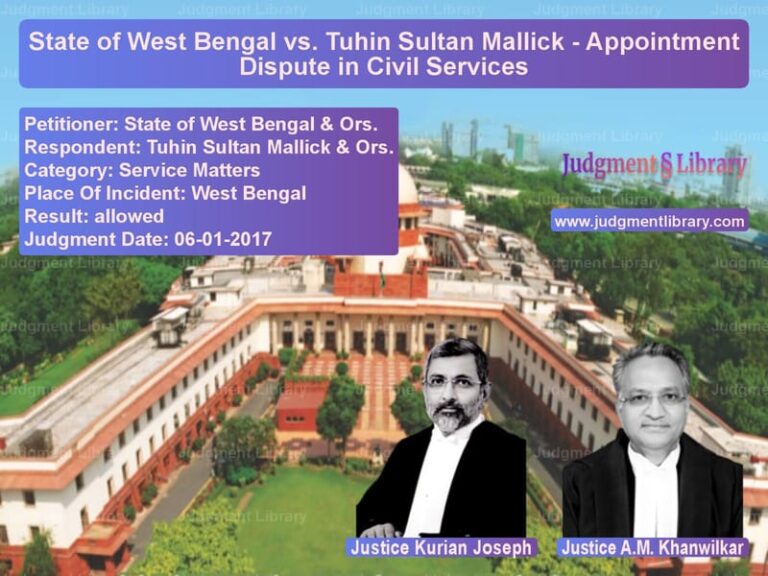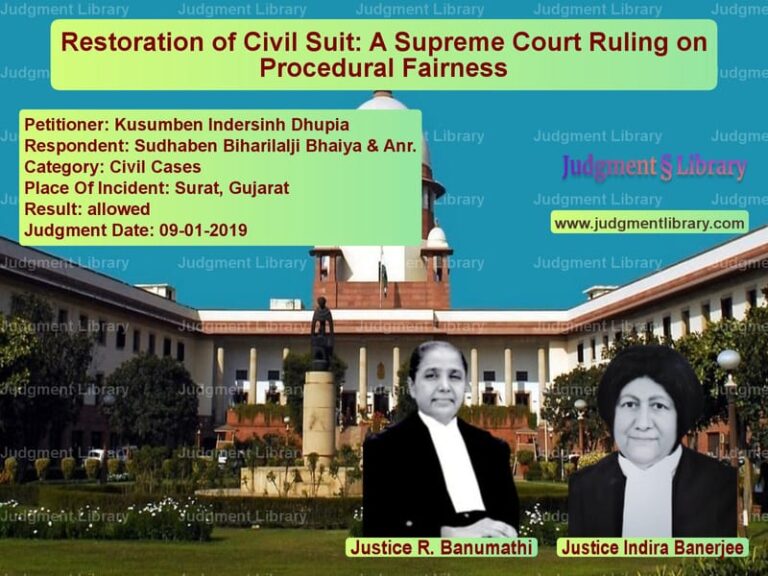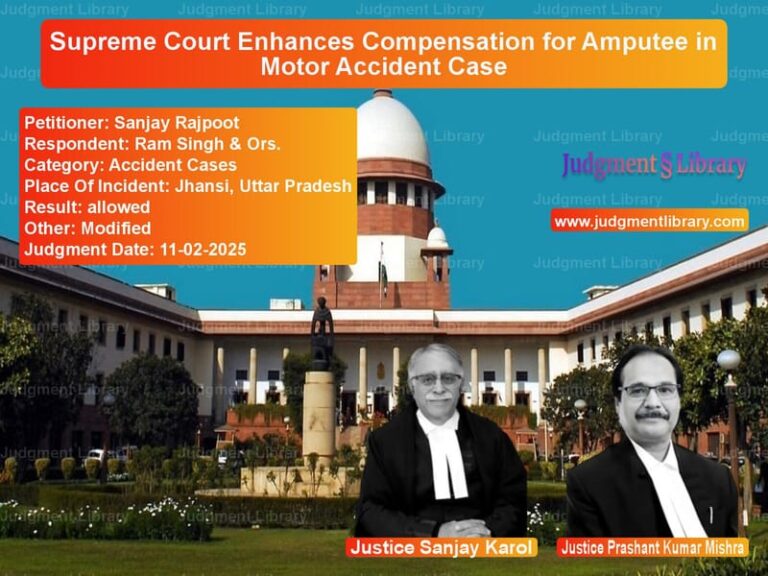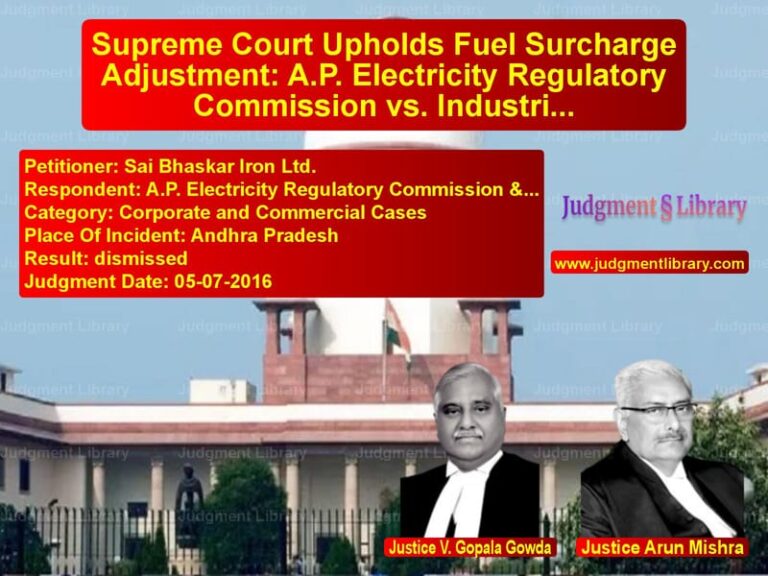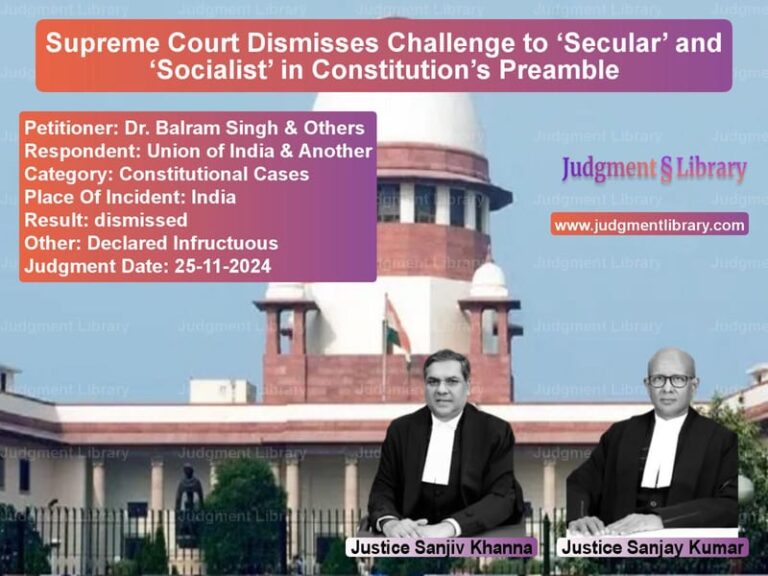Supreme Court Upholds Conviction in 2003 Uttar Pradesh Murder Case
The Supreme Court of India, on August 29, 2022, delivered a significant judgment in the case of Sanju and Others vs. State of Uttar Pradesh. The case involved a murder and attempt to murder that took place on August 11, 2003, in Village Sahnaul, District Aligarh, Uttar Pradesh. The appellants, Bhagwati Singh and his three sons—Bhoop Singh, Balwant Singh, and Sanju Singh—were convicted for the murder of Chandrapal Singh and the attempted murder of Rakesh Kumar. The Supreme Court upheld the convictions but discarded the testimony of an unreliable witness.
This ruling reinforces the importance of reliable witness testimony while affirming the principle that convictions must be based on solid and consistent evidence.
Background of the Case
According to the prosecution, on the evening of August 11, 2003, at around 4:30 PM, the appellants confronted Chandrapal Singh outside his house regarding some stored bricks on disputed land. The argument escalated, leading to gunfire and fatal injuries.
Read also: https://judgmentlibrary.com/supreme-court-acquits-accused-in-1979-uttar-pradesh-murder-case/
The appellants were armed:
- Bhagwati Singh – armed with a lathi.
- Bhoop Singh, Balwant Singh, and Sanju Singh – armed with country-made pistols.
During the attack:
- Bhoop Singh fired at Chandrapal Singh, causing fatal injuries.
- Balwant Singh and Sanju Singh fired at Rakesh Kumar (PW-1), who managed to escape behind a wall.
- Bhagwati Singh assaulted Rakesh Kumar with a lathi when he tried to run inside his house.
Chandrapal Singh collapsed and died at the scene.
Trial Court Proceedings
The Trial Court convicted all four appellants under:
- Section 302 IPC (Murder): Life imprisonment and a fine of Rs. 5,000. In default of payment, an additional one month of simple imprisonment.
- Section 307 IPC (Attempt to Murder): Seven years of rigorous imprisonment and a fine of Rs. 3,000. In default, an additional fifteen days of simple imprisonment.
The sentences were to run concurrently.
Appeal Before the High Court
The accused appealed before the Allahabad High Court, which upheld their convictions on December 18, 2012, rejecting their claims of mistaken identity and false implication.
Arguments Before the Supreme Court
Appellants’ Arguments
The defense argued that:
- The place of occurrence and presence of Rakesh Kumar (PW-1) were doubtful.
- The witness Ramphal Singh (PW-2) was unreliable as he was introduced late in the trial.
- No empty cartridges were recovered from the crime scene.
- The injuries on Rakesh Kumar were fabricated.
Prosecution’s Arguments
The prosecution, represented by the State of Uttar Pradesh, countered:
- The incident was corroborated by Rakesh Kumar (PW-1), who was present at the scene.
- The medical examination confirmed Rakesh Kumar had six injuries, proving he was attacked.
- The FIR was registered promptly, strengthening the prosecution’s case.
- The autopsy confirmed that Chandrapal Singh died of a gunshot wound.
Supreme Court’s Observations
1. Validity of Rakesh Kumar’s Testimony
The Court found Rakesh Kumar’s (PW-1) statement credible:
“Rakesh Kumar (PW-1) was subjected to lengthy cross-examination but remained consistent. His injuries were medically examined, confirming his presence at the crime scene.”
2. Unreliability of Witness Ramphal Singh (PW-2)
The Court discarded the testimony of Ramphal Singh (PW-2), stating:
“Ramphal Singh’s (PW-2) testimony is unreliable as his statement was recorded nearly 20 days after the incident. His sudden emergence as an eyewitness raises serious doubts.”
3. Autopsy and Medical Examination
The Supreme Court confirmed that Chandrapal Singh’s death was due to firearm injuries:
“The postmortem report confirms a gunshot wound as the cause of death, corroborating Rakesh Kumar’s (PW-1) account.”
4. No Impact of Missing Empty Cartridges
The Court dismissed the argument about the missing empty cartridges:
“The absence of empty cartridges does not negate the occurrence. Villagers had gathered at the scene before police arrived, which could explain their disappearance.”
Final Judgment
The Supreme Court upheld the convictions and dismissed the appeal:
“The prosecution has proved its case beyond a reasonable doubt. The appeal is dismissed.”
The Court ordered:
- Appellant Bhoop Singh, who was on bail, must surrender within one month. If he fails, authorities will take him into custody.
- Other appellants remain incarcerated to serve their sentences.
Impact of the Judgment
The ruling has far-reaching implications:
- Strengthens reliance on credible witnesses: Courts must discard unreliable testimonies.
- Reinforces medical evidence in trials: Physical injuries corroborating witness statements strengthen prosecution cases.
- Clarifies firearm evidence standards: The absence of empty cartridges does not automatically weaken the case.
Conclusion
The Supreme Court’s decision in Sanju and Others vs. State of Uttar Pradesh reaffirms the principle that criminal convictions must be based on consistent and credible evidence. By upholding the conviction while rejecting unreliable testimony, the Court ensured that justice was based on factual and medical evidence rather than procedural gaps. This ruling strengthens the importance of medical corroboration and timely witness testimonies in criminal cases.
Petitioner Name: Sanju and Others.Respondent Name: State of Uttar Pradesh.Judgment By: Justice Sanjiv Khanna, Justice Bela M. Trivedi.Place Of Incident: Aligarh, Uttar Pradesh.Judgment Date: 28-08-2022.
Don’t miss out on the full details! Download the complete judgment in PDF format below and gain valuable insights instantly!
Download Judgment: sanju-and-others-vs-state-of-uttar-prade-supreme-court-of-india-judgment-dated-28-08-2022.pdf
Directly Download Judgment: Directly download this Judgment
See all petitions in Murder Cases
See all petitions in Bail and Anticipatory Bail
See all petitions in Custodial Deaths and Police Misconduct
See all petitions in Judgment by Sanjiv Khanna
See all petitions in Judgment by Bela M. Trivedi
See all petitions in dismissed
See all petitions in supreme court of India judgments August 2022
See all petitions in 2022 judgments
See all posts in Criminal Cases Category
See all allowed petitions in Criminal Cases Category
See all Dismissed petitions in Criminal Cases Category
See all partially allowed petitions in Criminal Cases Category

